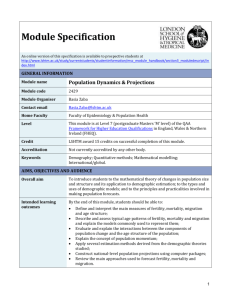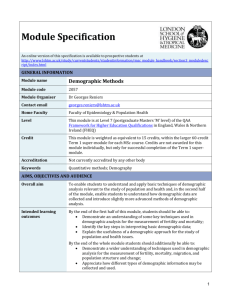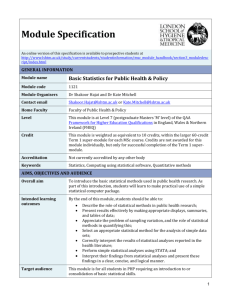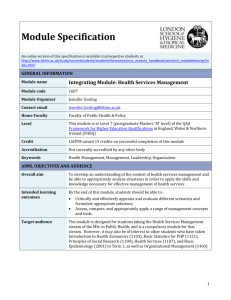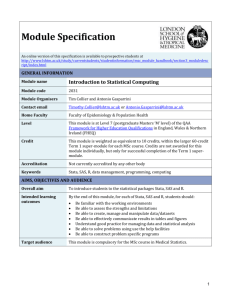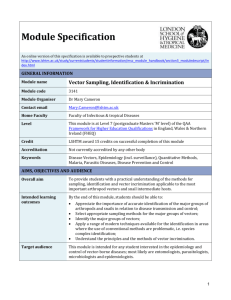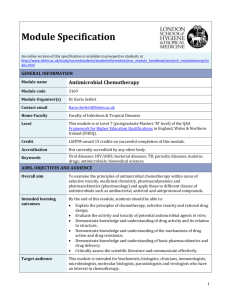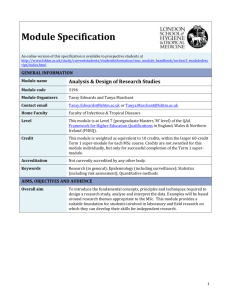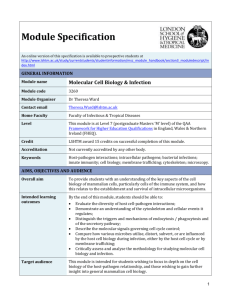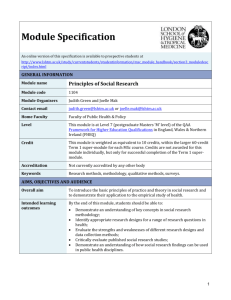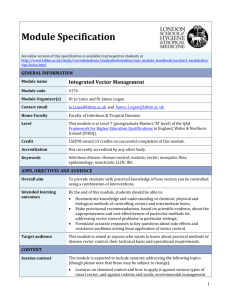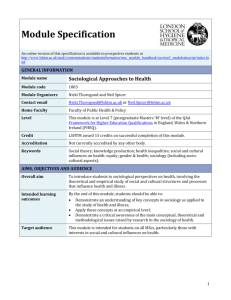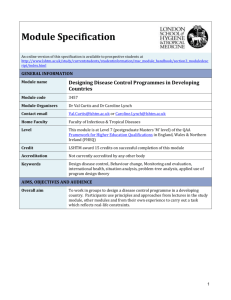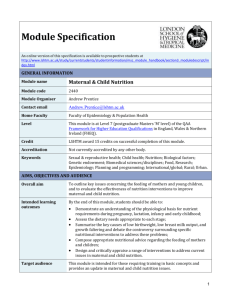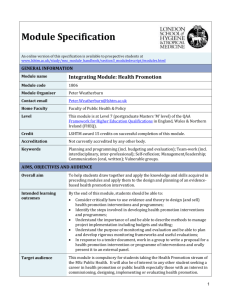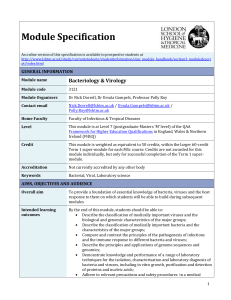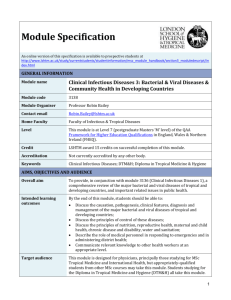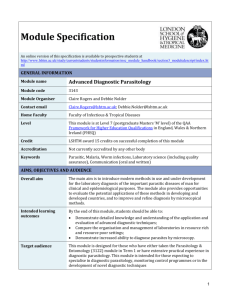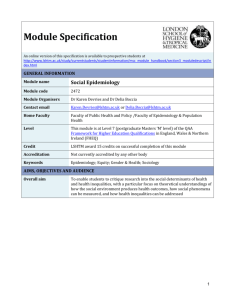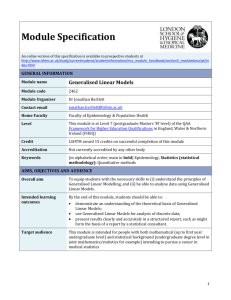2011 Population Studies Module Specification
advertisement
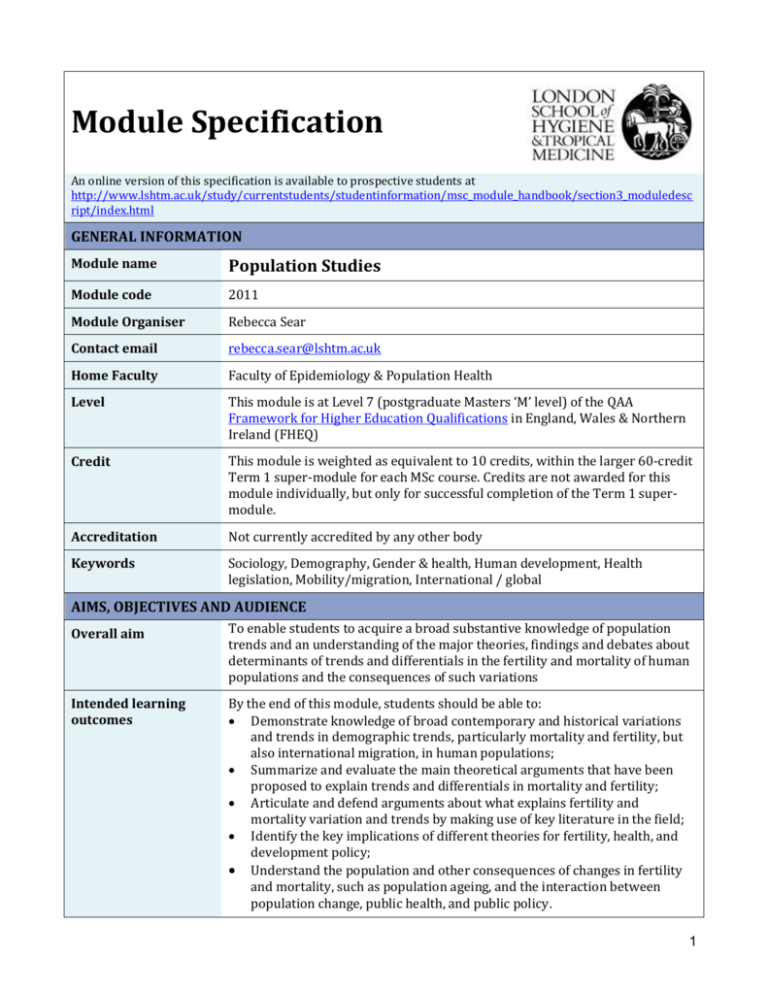
Module Specification An online version of this specification is available to prospective students at http://www.lshtm.ac.uk/study/currentstudents/studentinformation/msc_module_handbook/section3_moduledesc ript/index.html GENERAL INFORMATION Module name Population Studies Module code 2011 Module Organiser Rebecca Sear Contact email rebecca.sear@lshtm.ac.uk Home Faculty Faculty of Epidemiology & Population Health Level This module is at Level 7 (postgraduate Masters ‘M’ level) of the QAA Framework for Higher Education Qualifications in England, Wales & Northern Ireland (FHEQ) Credit This module is weighted as equivalent to 10 credits, within the larger 60-credit Term 1 super-module for each MSc course. Credits are not awarded for this module individually, but only for successful completion of the Term 1 supermodule. Accreditation Not currently accredited by any other body Keywords Sociology, Demography, Gender & health, Human development, Health legislation, Mobility/migration, International / global AIMS, OBJECTIVES AND AUDIENCE Overall aim To enable students to acquire a broad substantive knowledge of population trends and an understanding of the major theories, findings and debates about determinants of trends and differentials in the fertility and mortality of human populations and the consequences of such variations Intended learning outcomes By the end of this module, students should be able to: Demonstrate knowledge of broad contemporary and historical variations and trends in demographic trends, particularly mortality and fertility, but also international migration, in human populations; Summarize and evaluate the main theoretical arguments that have been proposed to explain trends and differentials in mortality and fertility; Articulate and defend arguments about what explains fertility and mortality variation and trends by making use of key literature in the field; Identify the key implications of different theories for fertility, health, and development policy; Understand the population and other consequences of changes in fertility and mortality, such as population ageing, and the interaction between population change, public health, and public policy. 1 Target audience This module is suitable for any student who needs to know about trends and variations in fertility and mortality in human populations, theories about the determinants of such trends and the implications they, and associated changes in population size and structure, have for public health and public policy. The module is a core course for the MSc in Demography and Health. CONTENT Session content The module is expected to include sessions addressing the following topics (though please note that these may be subject to change): Structure of demographic transition in historical Europe and contemporary less developed countries Theoretical perspectives on population change Importance of economic and lifestyle factors, public health measures and clinical care as determinants of mortality and health. Persistence of differentials health and fertility differentials in contemporary times Future prospects for countries at the end of the demographic transition. Demographic and public health consequences of population change Population policies TEACHING, LEARNING AND ASSESSMENT Study resources provided or required A handbook is supplied with readings. Teaching and learning methods A combination of lectures, student presentations and workshops. Assessment details An essay assignment forms an integral part of the module and is used to assess progress. Formal assessment is by written examination in June (Paper 1 exam). Assessment dates Assessments will be due on a date notified by the Module Organiser. For students who are required to re-sit, or granted a deferral or new attempt at the written examination, the next examination date will normally be the following May/June. Language of study and assessment English (please see ‘English language requirements’ below regarding the standard required for entry). TIMING AND MODE OF STUDY Duration The module runs for 10 weeks at 0.5 days per week; this module runs on Monday afternoons. Dates For 2015-16, the module will start on Monday 5 October 2015 and finish on Monday 14 December 2015. Timetable slot The module runs in LSHTM timetable slot Term 1 Mode of Study The module is taught face-to-face in London. Both full-time and part-time students follow the same schedule. 2 Learning time The notional learning time for the module totals 100 hours, consisting of: Contact time ≈ 30 hours Directed self-study ≈20 hours Self-directed learning ≈ 20 hours Assessment, review and revision ≈ 30 hours APPLICATION, ADMISSION AND FEES Pre-requisites None English language requirements A strong command of the English language is necessary to benefit from studying the module. Applicants whose first language is not English or whose prior university studies have not been conducted wholly in English must fulfil LSHTM’s English language requirements, with an acceptable score in an approved test taken in the two years prior to entry. Applicants may be asked to take a test even if the standard conditions have been met. Student numbers Student numbers are typically 20 per year; numbers may be capped due to limitations in facilities or staffing. Student selection The module is a core course for the MSc in Demography and Health. Partial Registration (partial participation) by LSHTM research degree students is allowed for this module. Preference will be given to LSHTM MSc students and LSHTM research degree students. Other applicants meeting the entry criteria will usually be offered a place in the order applications are received, until any cap on numbers is reached. Applicants may be placed on a waiting list and given priority the next time the module is run. Fees For registered LSHTM MSc students, fees for the module are included within MSc fees (given on individual course prospectus pages). If registering specifically for this module, as a stand-alone short course, individual module fees will apply. Tuition fees must be paid in full before commencing the module, or by any fee deadline set by the Registry. Scholarships Scholarships are not available for individual modules. Some potential sources of funding are detailed on the LSHTM website. Admission deadlines For 2015-16: For registered LSHTM MSc students, the module choice deadline is the end of Term 1 Orientation Week, Friday 2 October 2015. If registering specifically for this module, applications may be made at any time. The School gives priority to the needs of students registering for Masters and Research Degrees, and so places on any module may be limited - early application is therefore advised. Formal registration will take place on the morning of the first day of the module. 3 ABOUT THIS DOCUMENT This module specification applies for the academic year 2015-16 Last revised 03 June 2015 by Rebecca Sear London School of Hygiene & Tropical Medicine, Keppel St., London WC1E 7HT. www.lshtm.ac.uk 4
